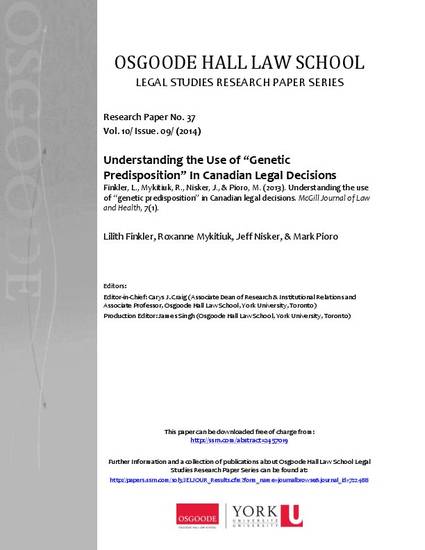
- Human Genome Project,
- genetic science,
- genetic predisposition
Since the advent of the Human Genome Project in 1989, the ethical, legal, and social implications inherent in future genetic science and its applications have worried researchers and scholars in law and ethics. Concern that the results of genetic testing might be used to discriminate against particular individuals and groups of individuals has been paramount, prompting calls for specific legislation to protect against genetic discrimination. Against this backdrop we sought to investigate instances of genetic discrimination in Canadian legal decisions. We searched Canadian court and administrative tribunal decisions, using the key words “genetic predisposition” and its cognates, and found none that took up the issue of genetic discrimination. However, in 468 decisions, “genetic predisposition” was used by courts and tribunals when describing the causal origins of health related conditions. Genetic predisposition was cited with respect to numerous health conditions, and in various areas of law, in particular criminal, family, workers’ compensation, and tort. In several criminal law decisions, genetic predisposition served to explain the origin of a mental health condition in addressing the issue of criminal responsibility. The predominant use in family law was in describing a child’s health condition in crown wardship and youth protection proceedings. In workers’ compensation and tort, genetic predisposition was used to argue whether the claimant’s condition was inherited rather than related to the workplace or the negligence of the defendant. Genetic predisposition, when used to argue the issue of disease causation on a balance of probabilities, reflects “geneticization”: the tendency to describe the underlying basis of health and disease as genetic. Geneticization, like genetic discrimination, can be problematic. Specifically, both may exaggerate the extent to which genetic information is exceptional and determinative of health and disease outcomes. Also, geneticization, like genetic discrimination, may marginalize people on a perceived genetic basis.
Available at: http://works.bepress.com/roxanne_mykitiuk/20/
